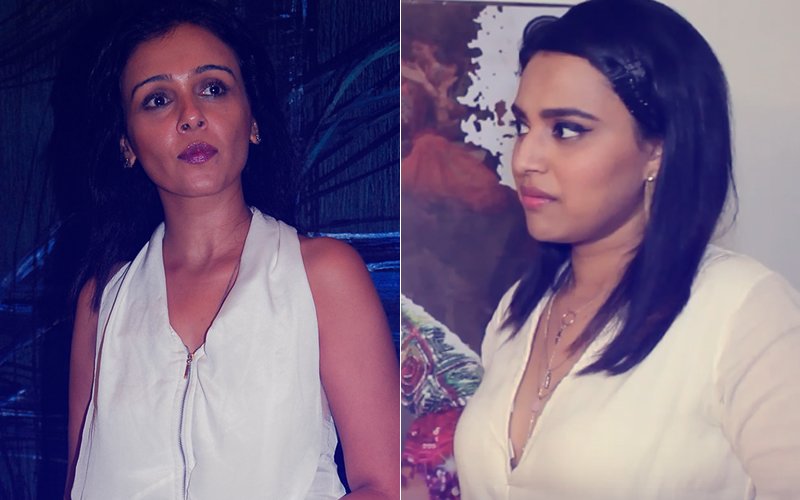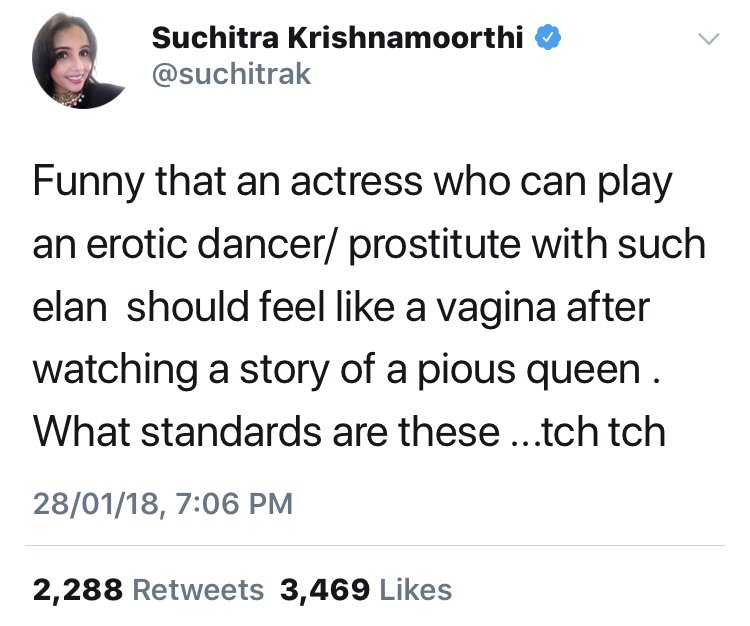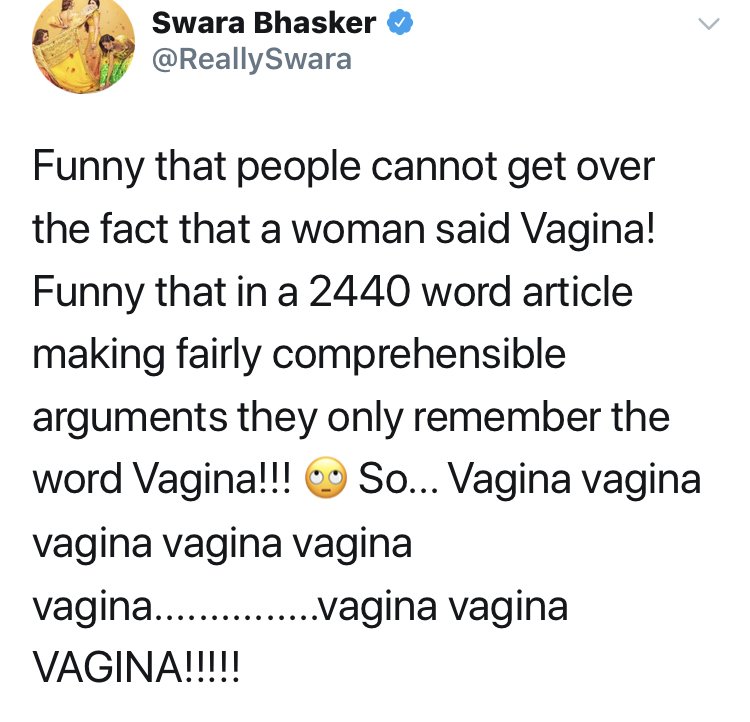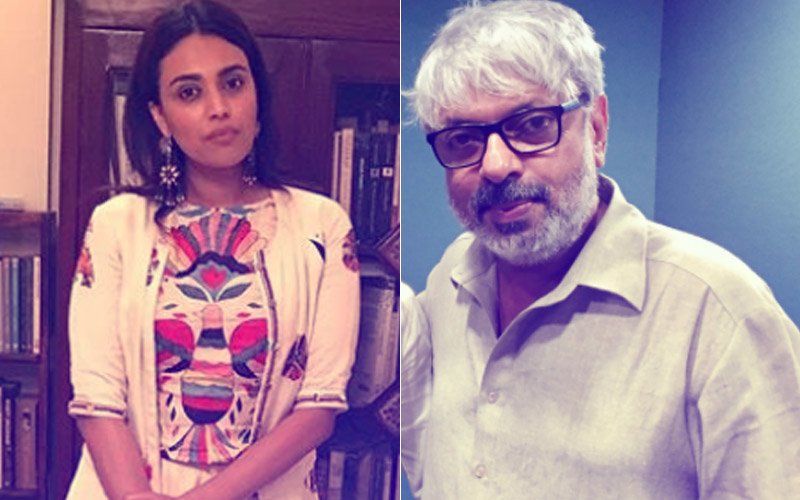Suchitra Krishnamoorthi BLASTS Swara Bhasker’s Open Letter, Actress HITS BACK
Swara Bhasker’s issues with Padmaavat didn’t go down well with Suchitra Krishnamoorthi. The latter took to Twitter to question the former’s “standards”. Swara too hit back at the Kabhi Haan Kabhi Naa actress

Swara Bhasker’s strongly-worded letter to Sanjay Leela
Bhansali over the (disappointing) glorification of Sati and Jauhar in Padmaavat made
many sit up and take notice. In the scathing letter, the actress states that
she felt “reducing to a vagina” post watching the magnum opus.
Now, Suchitra Krishnamoorthi has slammed Swara’s open
letter questioning her standards. She wrote, “Funny that an actress who can
play an erotic dancer/ prostitute with such elan should feel like a vagina
after watching a story of a pious queen. What standards are these ...tch tch
(sic).”
Suchitra Krishnamoorthi's Tweet
Responding to the Kabhi Haan Kabhi Naa actress, Swara
tweeted, “Funny that people cannot get over the fact that a woman said Vagina!
Funny that in a 2440 word article making fairly comprehensible arguments they
only remember the word Vagina!!! So... Vagina vagina vagina vagina vagina
vagina...............vagina vagina VAGINA!!!!!”
Swara Bhasker's Tweet
Meanwhile, for those of you who missed the letter, here
are a few excerpts:
Women have the right to live, despite being raped
sir.Women have the right to live, despite the death of their husbands, male
‘protectors’, ‘owners’, ‘controllers of their sexuality’.. whatever you
understand the men to be.
Women have the right to live — independent of whether men
are living or not.
Women have the right to live. Period.
Women are not only walking talking vaginas.
Yes, women have vaginas, but they have more to them as
well. So their whole life need not be focused on the vagina, and controlling
it, protecting it, maintaining its purity. (Maybe in the 13th century that was
the case, but in the 21st century we do not need to subscribe to these limiting
ideas. We certainly do not need to glorify them.)
It would be nice if the vaginas are respected; but in the
unfortunate case that they are not, a woman can continue to live. She need not
be punished with death, because another person disrespected her vagina without
her consent.
There is life outside the vagina, and so there can be
life after rape. (I know I repeat, but this point can never be stressed
enough.)
In general there is more to life than the vagina.
She adds, “You may be wondering why the hell I am
going on and on thus about vaginas. Because Sir, that’s what I felt like at the
end of your magnum opus. I felt like a vagina. I felt reduced to a vagina–only.
I felt like all the ‘minor’ achievements that women and women’s movements have
made over the years– like the right to vote, the right to own property, the
right to education, equal pay for equal work, maternity leave, the Vishakha
judgement, the right to adopt children…… all of it was pointless; because we were
back to basics.”
“I understand
that Jauhar and Sati are a part of our social history.
These happened. I understand that they are sensational, shocking dramatic
occurrences that lend themselves to splendid, stark and stunning visual
representation; especially in the hands of a consummate maker like yourself —
but then so were the lynchings of blacks by murderous white mobs in the
19th century in the US – sensational, shocking dramatic social
occurrences. Does that mean one should make a film about it with no perspective
on racism? Or, without a comment on racial hatred? Worse, should one make a
film glorifying lynchings as a sign of some warped notion of hot-bloodedness,
purity, bravery – I don’t know, I have no idea how possibly one could glorify
such a heinous hate crime,” the letter further states.
“Sir, you will say to me that I am over-reacting and that
I must see the film in its context. That it’s a story about people in the
13th Century. And in the 13th century that’s what life was– polygamy
was accepted, Muslims were beasts who devoured meat and women alike, and
honourable Hindu women happily jumped into their husbands funeral pyre, and if
they couldn’t make it to the funeral, they built a pyre and rushed into it — in
fact, they liked the idea of collective suicide so much that they gleefully
discussed it over their daily beautification
rituals... The context of your film is India in the
21st century; where five years ago, a girl was gang-raped brutally in the
country’s capital inside a moving bus. She didn’t commit suicide because her
honour had been desecrated, Sir. She fought her six rapists. She fought them so
hard that one of those monsters shoved an iron rod up her vagina. She was found
on the road with her intestines spilling out. Apologies for the graphic
details, Sir, but this is the real ‘context’ of your film.”
Image Source: youtube/ikarmik & facebook/suchitrakrishnamoorthi
